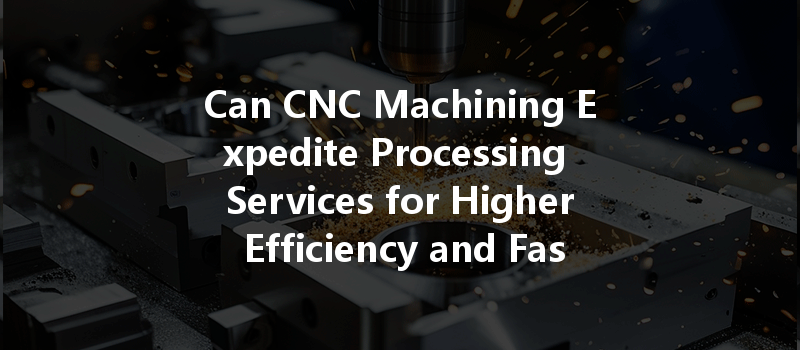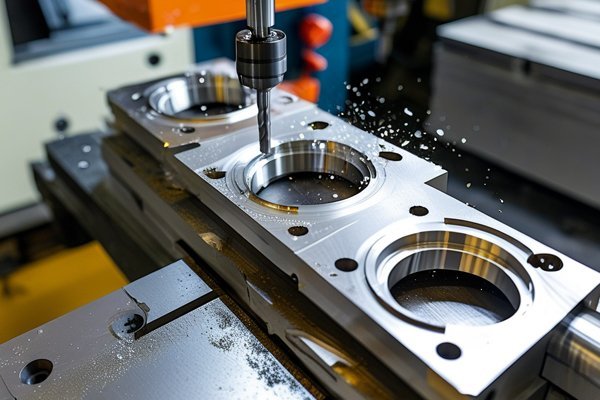Did you know that the CNC machining market is projected to reach $100 billion by 2025? This remarkable growth highlights the increasing reliance on computer numerical control (CNC) technology to enhance manufacturing capabilities across various industries. Among the many advantages CNC machining offers, expedited processing services stand out as a critical factor that can significantly boost operational efficiency and customer satisfaction. In this blog, we’ll delve into the ins and outs of CNC machining, exploring how it can expedite processing services and contribute to a faster turnaround time.
Understanding CNC Machining: A Brief Overview
CNC machining refers to the automated control of machining tools through computer systems. Unlike traditional machining methods, CNC provides enhanced precision, consistency, and flexibility. The technology can work with various materials, including metals, plastics, and composites, making it versatile for numerous applications.
Types of CNC Machining Processes
CNC machining encompasses various processes, including:
Understanding these CNC machining processes is vital because their capabilities significantly influence how quickly and effectively a project can be executed.
Why Expedited Processing Services Matter
In today’s fast-paced business environment, speed is paramount. Customers expect quicker turnaround times, and companies must find ways to meet these demands while maintaining quality. Here are several reasons why expedited processing services are crucial:
How does CNC machining play a role in achieving these benefits? Let’s explore!
The Role of CNC Machining in Expedited Processing Services
One of the most significant advantages of CNC machining is its automation capabilities. Once a design is created and programmed into the CNC system, the machine can operate independently with minimal human intervention. This reduces the chances of human error and ensures consistent quality, allowing for rapid production without sacrificing precision.
In traditional machining, setup times can be lengthy, significantly affecting turnaround. CNC machining reduces these setup times by utilizing pre-set programs. Changes in project specifications or designs can be quickly adjusted in the CNC software, allowing for a faster transition between jobs.
Modern CNC machines are capable of multi-tasking, meaning they can perform multiple operations on a single workpiece within one setup. For instance, a single CNC milling machine might drill, mill, and even tap threads in one go. This efficiency directly contributes to expedited processing, as it reduces the need for multiple setups and handling.
CNC machining allows for precise cuts, which minimizes material waste. This not only enhances cost savings but also enables faster production since there’s less material to manage. By optimizing material utilization, manufacturers can increase their output without compromising quality.
CNC machining is instrumental in rapid prototyping. The speed at which prototypes can be developed allows companies to test ideas, designs, and functions more quickly. This agility fosters innovation and responsiveness to market demands, further contributing to expedited services.
CNC machining often comes equipped with software that allows for real-time tracking and updating of a project throughout its lifecycle. This transparency improves communication with clients, making it easier to manage expectations and adapt to any required changes in real-time.

Implementing CNC Machining for Expedited Processing
To fully harness the benefits of CNC machining for expedited processing, businesses can consider the following strategies:
Investing in high-quality CNC machinery and software is essential. Modern CNC machines equipped with the latest technology can perform advanced operations and provide quicker processing times.
Analyzing your current workflow can reveal bottlenecks that hinder productivity. Implementing lean manufacturing principles alongside CNC machining can help streamline processes.
Training your staff on the latest CNC technology ensures that they can operate machines effectively. A well-trained workforce can better manage transitions between jobs and maintenance, which is vital for expediting processing.
Implementing robust quality control measures can prevent defects that slow down production. Ensure that the CNC process includes checks that maintain high standards without hindering speed.
Collaborating closely with suppliers can ensure a swift material supply chain, enabling prompt processing. Having reliable suppliers can greatly reduce lead times associated with procuring necessary resources.
Utilizing feedback from customers at each stage of the production process can lead to rapid adjustments and refinements. CNC machining’s flexibility is an asset here, allowing for quick reiterations of prototypes based on client input.
Case Studies of CNC Machining in Action
Example 1: Aerospace Industry
The aerospace industry requires precision and rapid turnaround for its components. One notable case study involves a company that streamlined its manufacturing process by adopting CNC machining for engine components. They reduced their turnaround time from several weeks to just a few days by implementing 5-axis CNC machines capable of multi-tasking and optimizing material use.
Example 2: Medical Devices
A medical device manufacturer faced intense pressure to deliver high-quality products quickly to meet regulatory demands. By incorporating CNC machining, they were able to create prototypes of surgical instruments with exceptional accuracy in mere days instead of weeks. They enhanced their throughput and significantly improved client relationships through rapid product delivery.
Example 3: Automotive Parts
In the automotive industry, a leading manufacturer adopted CNC machining to decrease lead times for custom parts. Utilizing CNC milling and turning, they achieved a production time reduction of 40%. This agile manufacturing process allowed them to respond rapidly to fluctuating production schedules.
Counterarguments to Consider
While CNC machining offers numerous benefits for expedited processing, it’s important to consider potential drawbacks:
As industries evolve and consumer demands continue to rise, the importance of expedited processing services cannot be overstated. CNC machining stands out as a powerful solution, offering unparalleled precision, efficiency, and speed. By automating processes, shortening setup times, and enabling rapid prototyping, CNC technology can transform how businesses operate—ultimately driving enhanced customer satisfaction and competitive advantage.
In summary, investing in CNC machining is not merely an operational decision; it’s a strategic choice that can redefine a company’s ability to respond to market opportunities swiftly. Understanding the benefits and implementation strategies we’ve discussed is critical for any modern manufacturing business.
This blog serves as a reminder of how important it is to rethink production methodologies in an increasingly fast-paced world. Companies that leverage CNC machining effectively for expedited processing will find themselves at the forefront of their industries, ready to meet the challenges of the future. So, as you consider your manufacturing capabilities, remember the power of CNC machining and its potential to elevate your business to new heights.






